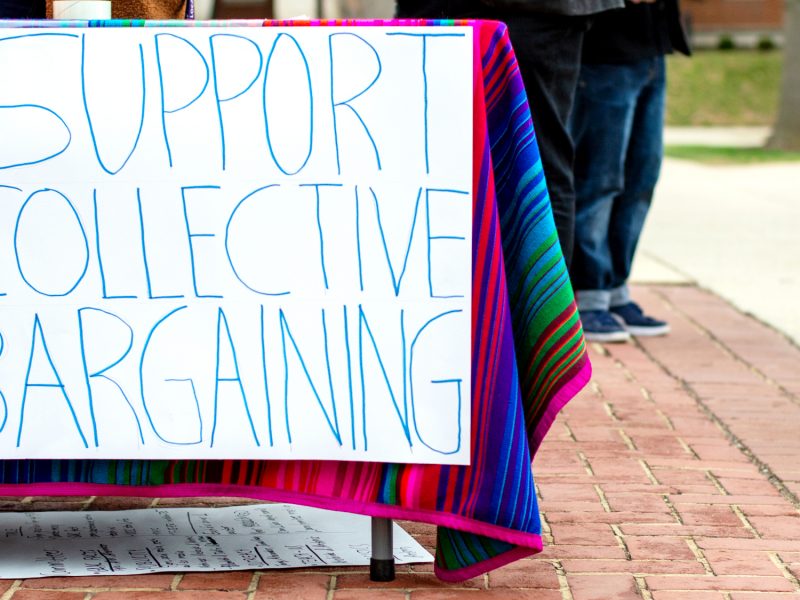There’s this feeling whenever you’ve convinced yourself that you’re doing something right, even when you know others may not think so. I know this feeling, you know this feeling, the protesters in airports around the country know this feeling, even the former acting attorney general knows this feeling. It’s visceral. It gives you the power to believe that you understand something about this universe that others don’t.
But if I were to put a gun to your head to compel you to tell me what exactly you feel, what the secrets of the universe are that you think you now understand, only a sliver of your knowledge would come out.
***
People who know me know that I have a fascination with the devil. I’m not a religious person, but I truly believe the devil is the least understood and most neglected character in religious scripture. In a column I wrote a few years ago, I talked about how differently Satan’s fall from grace is perceived in the Abrahamic religions, namely in Christianity and a sect of Islam. In both versions, Satan is cast from heaven for defying God. In the Bible, the reason is more or less because he was evil and selfish. Who knows what he was thinking? Who cares? In the Sufism sect of Islam however, this story takes a more nuanced approach.
In the book Early Islamic Mysticism by University of Chicago professor Michael Sells, he translates the story of Satan, otherwise known as Iblis, from the 10th century mystic Mansur al-Hallaj, who says that Iblis’ fall from grace was due to his refusal to obey God’s orders to bow to Adam. Iblis said, “I will not bow before any other than [God] even if he torments me in his fire forever and beyond,” due to his belief that there is no other worthy of worship.
Ironically, it was Iblis’ devotion to God that led to his own downfall. It poses an important question on what you should do when the thing you love most forces you into an impossible situation. It’s hard to think of such a dilemma occurring in our own lives. However, this was exactly what Sally Yates had to face just a few days ago when she decided to tell her staff at the Justice Department not to defend President Donald Trump’s executive order on restricting travel from Muslim-majority countries.
The criticisms of her actions came swiftly. Josh Blackman, associate professor at South Texas College of Law, stated in an episode of BBC Newshour that Yates’ decision was one of “self-adulation,” and that her scheme proved pointless. He then continued that her decision quickly led to her replacement by someone else who had no qualms with obeying the executive order. Others say she should not have questioned the orders of the president in the first place, and should have just “done her job.”
I find these criticisms to be especially specious.
If we continue to categorize actions into good and evil, if we continue to ridicule acts of defiance, what kind of choices will that train members of our society to make when faced with impossible decisions?
To politicians, perhaps one’s outcome, one’s status, one’s tangible results in life are important in defining who we are. But to Iblis, the consequence of his banishment from heaven was immaterial. The decision that defined him centered upon his choice between true faith and status — reason and unquestioning obedience. It is easy to point to Yates and call her a traitor, just as it was easy to brand Satan as the epitome of evil for challenging a higher power. It is easy because it prevents us from confronting the fact that life is complex and nuanced. It makes it simple for us to dehumanize by using words like “good” and “evil,” and it prevents us from having to think multidimensionaly about many things, including the devil. But it takes someone defiant to understand what to do when faced with a situation where there seems to be no way out. Yates chose faith in justice over status — reason over obedience. She understood that for her devotion to the Justice Department to hold true, she must do as Iblis did and sacrifice herself when there was nothing else she could give. Perhaps she was spurred by that same feeling we all sometimes feel, that gives us the power to fight for the things we believe in. Perhaps this feeling is nothing more than the beating of your heart, and the only person who truly needs to understand the secrets that drive your actions is you.
But sometimes we must understand that despite our convictions, despite our drive, despite what we think we know, our journey cannot lead to victory — our resistance cannot reverse executive orders as quickly as we want it to, and casualties will follow. And in these times of anguish and hopelessness, we should remember what Iblis said, and what Yates must have known when there was nothing left to give. As al-Hallaj said: “In love I am triumphant. How not?”
Patrick An 16′, former opinion editor, is a research fellow at the National Institutes of Health. He can be reached at patandbk@gmail.com.



